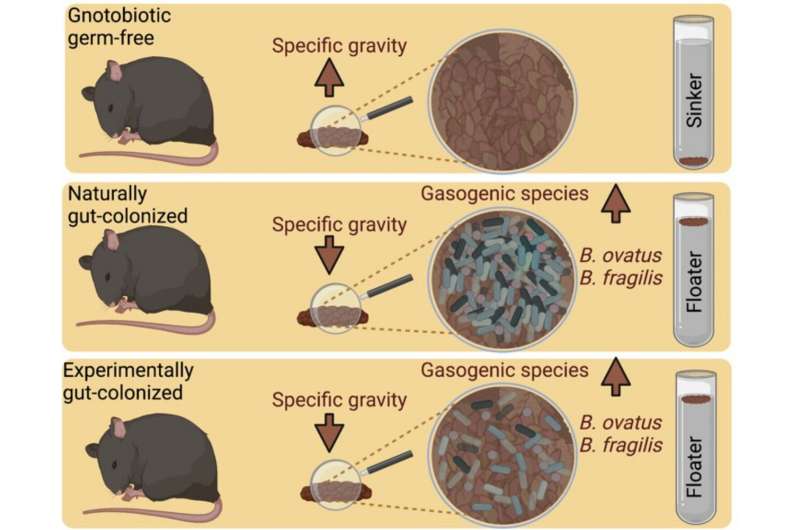November 18, 2022 report
Why some feces float and others sink

A team of researchers at the Mayo Clinic has solved the mystery of why some people find their bowel movements floating while others find theirs sinking to the bottom of the toilet bowl. In their paper published in the journal Scientific Reports, the group describes their accidental discovery of the answer.
Prior to the 1970s, scientists believed that fecal matter either sank or floated depending on the amount of fat it contained. Experiments showed that not to be the case. Instead, trials with healthy human subjects showed that the difference was due to the amount of gas in a given fecal sample. But the question still remained: Why does fecal matter from some people tend to have more gas, and hence, more buoyancy than that of others?
In this new effort, the researchers were studying the microbiome of several lab mice, and sterilized the guts of some of them as a way to isolate differences in digestion and overall health related to different bacteria. As the experiments proceeded, the researchers noticed that none of the fecal samples produced by the sterilized mice floated. In mice, normally half of samples are floaters.
That suggested that floating fecal matter was related to the makeup of the gut microbiome. The researchers then collected stool samples from healthy mice that were not part of the original study, but who produced floaters, and injected the material into the guts of the sterile mice. They found that all of the test mice began producing floaters. This, the researchers contend, suggests that the reason some fecal matter floats is due to the nature of the bacteria in the gut—some produce more gas than others.
The researchers were not able to isolate the bacteria that produced more gas, but did note that Bacteroides ovatus has previously been found to produce more flatulence in human patients. Logic suggests it is likely one of the culprits responsible for the formation of floaters in humans, and perhaps in lab mice. The team suggests more work will need to be done to confirm their suspicions and to find other bacteria involved in producing more gas, and thus floaters.
More information: Syed Mohammed Musheer Aalam et al, Genesis of fecal floatation is causally linked to gut microbial colonization in mice, Scientific Reports (2022). DOI: 10.1038/s41598-022-22626-x
Journal information: Scientific Reports
© 2022 Science X Network



















